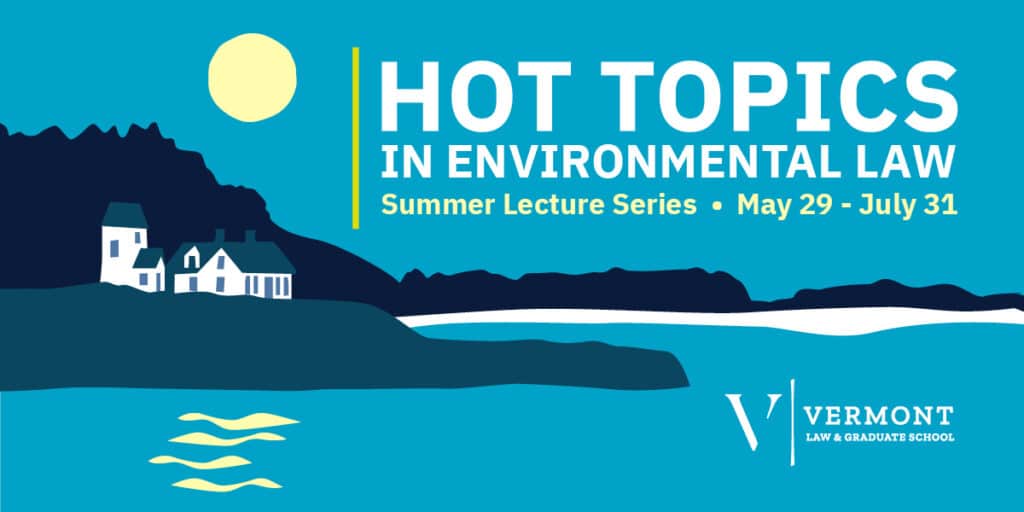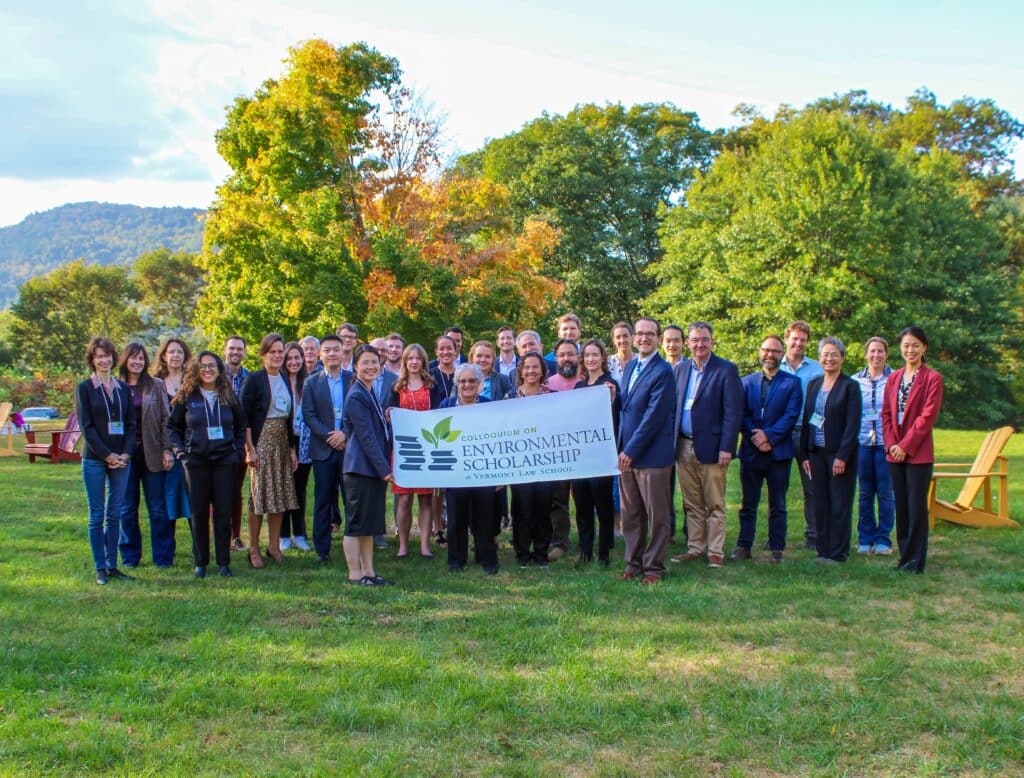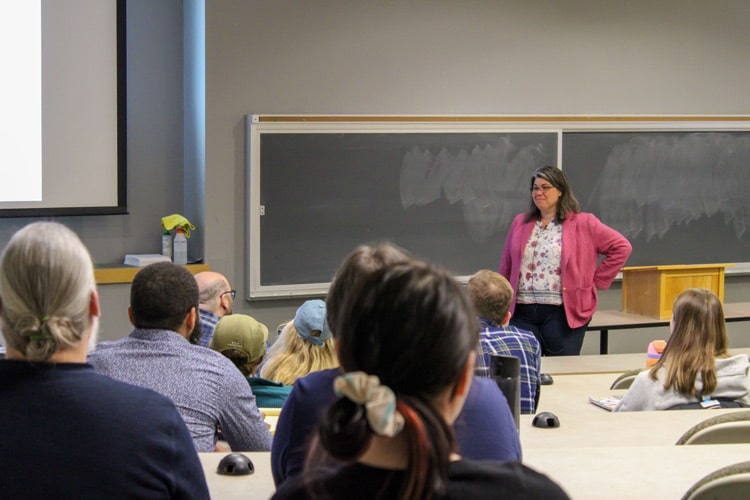
Environmental Law Center
- Overview
- Curriculum
- Environmental Law Center Statistics
- Summer at the Environmental Law Center
- Hot Topics Summer Lecture Series
- Hothouse Earth Podcast
- Colloquium on Environmental Scholarship
- 20th Annual Norman Williams Distinguished Lecture in Land Use Planning and the Law
- Emerging Environmental Law Curriculum Conference
- Parenteau Climate Action Fellowship
- People
- News and Events
- Additional Resources
- Newsletter
- Contact Us
Overview
Environmental challenges have never been more pressing or more complex. But at Vermont Law and Graduate School’s Environmental Law Center, a new generation of leaders is rising to meet them.
The Environmental Law Center (ELC) oversees the most comprehensive graduate environmental law program in the country. Consistently ranked among the nation’s best by U.S. News & World Report, our environmental law program includes six legal clinics, seven centers and institutes, 60+ environmental law courses, and 76 environmental faculty. We prepare students to work on the frontlines of environmental advocacy, energy and climate justice, animal law and protection, as well as the sustainable food movement. We develop leaders who can work with environmental and public policy issues within the framework of the legal system and are prepared to meet the environmental challenges of the 21st century.
Curriculum
Vermont Law School offers JD students the option to add a concentration to their degree. Environmental law students may pursue specialized concentrations in Animal Law, Climate Law, Energy Law, Food and Agriculture Law, Land Use Law, and Water Resources Law. Concentrations are a tangible indication demonstrating to prospective employers that students have mastered a specific subject matter area.
For more information on required courses, visit the concentration pages listed below.
Concentration in Food and Agricultural Law
Environmental Law Center Statistics
The Environmental Law Center hosts the nation’s premier environmental law program.
ENVIRONMENTAL FACULTY
76 Total Faculty
20 Regular Faculty
29 Summer Session Adjuncts
20 Online-only Adjuncts
ENVIRONMENTAL LAW AND POLICY COURSES
60+ Total Courses
26 Summer Session-only Courses
7 Environmental Field Courses
9 Animal Protection Courses
8 Climate Courses
9 Energy Regulation Courses
9 Environmental Justice and Public Health Courses
12 Food and Agriculture Courses
10 International Environmental Courses
11 Natural Resources Courses
6 Sustainability and Business Courses
ENVIRONMENTAL DEGREES AND PROGRAMS
6 Clinics
7 Centers and Programs
5 Environmental Master’s Degrees
1 Environmental Executive Master’s Degree
3 Environmental LLM Degrees
FIRST IN NATION FOR
Environmental Justice Course
Animal Rights Law Course
Environmental Tax Policy Course
ABA Acquiesced Masters Degree For Non-Lawyers
Summer at the Environmental Law Center
The Environmental Law Center assembles an exciting group of scholars, students, and distinguished visitors to study environmental law and policy during the most glorious time of year in northern New England.
In addition to Vermont Law and Graduate School (VLGS) students, our Summer Session is open to students from other schools and lifelong learners. We welcome students enrolled at other law schools and graduate institutions nationally and internationally, practicing attorneys, planners, state and federal agency personnel, upper-level undergraduate students (with the director’s permission), teachers, journalists, citizen advocates, and more.
Courses are taught by faculty from VLGS and other schools, international law scholars, leaders of non-profit advocacy groups, and private practitioners. Whether a student is interested in a specific area of study—such as energy law, international environmental law, water law, land use law, animal law, or agricultural law—or wishes to pursue a multidisciplinary approach, the summer program offers a wide array of options.
Summer Scholars and Media Fellows
Vermont Law and Graduate School invites leaders in the fields of environmental, energy, agriculture, animal advocacy, and international environmental law and journalism to serve as Distinguished Summer Scholars and Media Fellows in residency during the VLGS Summer Session. Each visiting scholar or fellow delivers a public lecture, participates in informal social events on campus, and is available to meet with students and faculty individually. These distinguished visitors are a significant intellectual resource for our summer students and also offer valuable networking opportunities. Learn more here.
Hot Topics Summer Lecture Series
Each summer, the Environmental Law Center hosts its Hot Topics in Environmental Law lecture series. On Tuesdays and Thursdays at noon, VLGS faculty and invited experts host lectures on a variety of current issues in environmental law and policy. Vermont Bar Association Continuing Legal Education (CLE) credit is available.
Lectures are free and open to the public. Access recordings of past events below.

2025 Video Archive
2024 Video Archive
2023 Video Archive
2022 Video Archive
2021 Video Archive
2020 Video Archive
Hothouse Earth Podcast
ELC faculty and staff are joined by experts in environmental law to provide concise, accessible conversation on the most pressing issues of our time.
Colloquium on Environmental Scholarship
Since 2009, Vermont Law and Graduate School has hosted an annual Colloquium on Environmental Scholarship. Colloquium participants are environmental law faculty in the U.S. and abroad. This event offers environmental law scholars the opportunity to present their works-in-progress, to get feedback from their colleagues, and to meet and interact with those who are also teaching and researching in areas related to environmental and natural resources law, or any related specialty areas.
Click here for more information about attending and/or submitting an abstract for consideration.

20th Annual Norman Williams Distinguished Lecture in Land Use Planning and the Law
This year’s speaker was Sarah Mills, Director, Center for EmPowering Communities; Clinical Associate Professor of Practice of Urban Planning, A Alfred Taubman College of Architecture and Urban Planning; and Adjunct Lecturer in Environment and Sustainability, School for Environment and Sustainability, University of Michigan.

The Norman Williams Distinguished Lecture in Land Use Planning and the Law series is named for Norman Williams, who came to Vermont Law School in 1975 after a long and distinguished career in public service and teaching, particularly in the area of land use planning. Professor Williams played a key role in founding the Environmental Law Center. The lecture series is a gift of Frances Yates, trustee of VLGS, in memory of Professor Williams, Charles Yates JD’93, and Anya Yates JD’94.
Listen to Mills’s talk, “Navigating an Energy Transition,” by clicking here.
Emerging Environmental Law Curriculum Conference
Environmental law professors assemble regularly to discuss scholarship, but there are fewer opportunities to gather with our peers from other schools to grow our skills as teachers. Join Vermont Law & Graduate School’s Environmental Law Center and colleagues from across the country for a conference designed for passionate environmental law faculty dedicated to providing future environmental leaders with cutting edge legal education.
This June 2024 conference builds on the first Emerging Environmental Law Curriculum Conference in 2019 and the subsequent 2021 curriculum roundtable series (transcripts and analysis published in Vermont Law Review, Vol. 46: Book 4). We aim to reconvene the curriculum conference every five years to share updated learnings and techniques for teaching emerging environmental law.
This conference will expand on the issues explored in our earlier gatherings as well as dive into new discussions of innovation in and out of the classroom. The conference will feature faculty panelists from law schools around the U.S.
Parenteau Climate Action Fellowship
The Environmental Law Center welcomed its inaugural Parenteau Climate Action Fellows in August 2025. The positions combine an opportunity to conduct academic, legal, and/or policy research on climate law with responsibilities to work with student clinicians in the Environmental Advocacy Clinic and Environmental Justice Clinic. These fellowship positions offer a strong starting point for an academic career in doctrinal or clinical environmental law teaching, and for other opportunities in public-interest climate policy and advocacy. The program honors the climate law leadership of Professor of Law Emeritus and Senior Fellow for Climate Policy Patrick Parenteau.
People
Faculty
Laurie Beyranevand JD’03
- Director, Center for Agriculture and Food Systems
- Pescosolido Professor of Food and Agricultural Law and Policy
- Professor of Law
In Memoriam – Richard Brooks
- Professor of Law Emeritus
- Founding Director, Environmental Law Center
Genevieve Byrne
- Professor of Law
- Staff Attorney, Farm & Energy Initiative
Jenny Carter
- Professor of Law
- Staff Attorney
Christophe Courchesne
- Associate Dean, Environmental and Experiential Programs
- Director, Environmental Law Center
- Director, Environmental Advocacy Clinic
- Associate Professor
Michael Dworkin
- Professor of Law Emeritus
- Founding Director, Institute for Energy and the Environment
Stephen Dycus
- Professor of Law Emeritus
John Echeverria
- Professor of Law
David B. Firestone
- Professor of Law
Mark James
- Interim Director, Institute for Energy and the Environment
- Associate Professor, Maverick Lloyd School for the Environment
- Associate Professor of Law, Vermont Law School
In Memoriam – Kevin B. Jones
- Director, Institute for Energy and the Environment
- Professor of Energy Technology and Policy
Siu Tip Lam
- Director, U.S.-Asia Partnerships for Environmental Law
- Professor of Law
Mark Latham
- Professor of Law Emeritus
Yanmei Lin
- Acting Director, Maverick Lloyd School for the Environment
- Professor of Law
- Deputy Director, U.S.-Asia Partnerships for Environmental Law
Reed Elizabeth Loder
- Professor of Law
Marc Mihaly
- Professor of Law Emeritus
Janet Milne
- Director, Environmental Tax Policy Institute
- Professor of Law
Pat Parenteau
- Professor of Law Emeritus
- Senior Fellow for Climate Policy, Environmental Law Center
Christine Ryan
- Environmental Law Librarian
- Associate Professor of Law
Joan Vogel
- Professor of Law
Delcianna Winders
- Director, Animal Law and Policy Institute
- Associate Professor of Law
L. Kinvin Wroth
- Professor of Law Emeritus
Administration
Courtney Collins
- Assistant Director
Christophe Courchesne
- Associate Dean, Environmental and Experiential Programs
- Director, Environmental Law Center
- Director, Environmental Advocacy Clinic
- Associate Professor
Donna Kowalewski
- Environmental Communications Specialist
Anne Linehan
- Director, Graduate Programs
- Staff Director, Environmental Law Center
Julie Ramage
- Program Coordinator, Environmental Law Center
Environmental Law Center News and Events

Final Call for Summer 2026 VLGS Media Fellow Applications
February 12Fellowships Available to Journalists Covering Issues in Environmental or Food & Agricultural Law and Policy SOUTH ROYALTON, Vt. (February 12, 2026) — The application dea…

Faculty and Staff in the News – January 2026
February 10Below is a selection of recent news highlights featuring members of Vermont Law and Graduate School’s faculty and staff. ChatGPT is the New WebMDJanuary 7, 2026Business …

Vermont Journal of Environmental Law Highlights 10 Issues to Watch
January 30Student-Run Journal’s Annual List Covers Pressing Environmental Topics for 2026 SOUTH ROYALTON, Vt. (January 30, 2026) — The Vermont Journal of Environmental Law, a public…

Faculty and Staff in the News – December 2025
January 8Below is a selection of recent news highlights featuring members of Vermont Law and Graduate School’s faculty and staff. Homeowners Sue Oil Companies as Climate Damage D…
Additional Resources
Environmental Law and Policy Brochure
Newsletter
Below are the most recent issues of the Environmental Law Center’s newsletter. Sign up here to subscribe and receive periodic updates on our projects, people, events, and more.
Contact Us
Environmental Law Center
at Vermont Law and Graduate School
802-831-1000
elc@vermontlaw.edu



